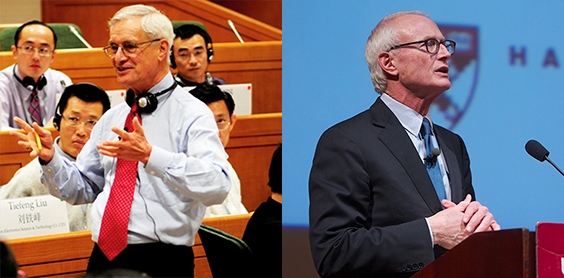Research in Action: Work of Michael E. Porter and Robert S. Kaplan Helps Hospital
 (LtoR) Robert S. Kaplan, Michael E. Porter
(LtoR) Robert S. Kaplan, Michael E. Porter
BOSTON—In an announcement about The University of Texas MD Anderson Cancer Center's Institute for Cancer Care Innovation, which explores a wide range of projects, including cancer economics, patient safety, and quality improvement, and which aims to deliver better care at a reduced cost, the Center credits the seminal work of Professors Michael E. Porter and Robert S. Kaplan for helping it enter the growing field of study known as the “science of improvement” or value–based research. According to the announcement, MD Anderson’s program originated in work with Porter, Harvard’s Bishop William Lawrence University Professor, based at Harvard Business School, who has championed the principles of value-based health care as the cornerstone for reforming health care delivery. “The focus of MD Anderson’s work in this area is to define, measure, and, most importantly, improve the value of its care and share results with other health care providers,” said the release. In addition, the Center collaborated with Kaplan, HBS’s Marvin Bower Professor of Leadership Development Emeritus, who developed the method for measuring the true costs of cancer care known as time-driven activity-based costing. This model “identifies the units of time it takes to perform a service and the cost per unit of time, then multiplies it by the quantity of the service. The tool provides realistic cost information that can be used in the equation to determine value,” the release explained. According to Kaplan, “This is an example of the tangible benefits from the active programs that Michael Porter and I conduct with leading health care institutions in the United States and globally.” “Patients, as well as insurance companies and government payers, want to know how MD Anderson provides precisely what is needed to properly treat cancer and how that quality care is balanced with what the institution charges and what it costs,” said Thomas W. Feeley, MD, the newly appointed head of the Institute for Cancer Care Innovation. “With preparations under way now for the new accountability, transparency, reimbursement, and measurement mandates of the Affordable Care Act, this research will be even more vital, and more institutions will be taking a look at the value they offer patients.” Kaplan is the co-developer of both activity-based costing and the Balanced Scorecard. His numerous books include The Execution Premium: Linking Strategy to Operations for Competitive Advantage, the fifth Balanced Scorecard book co-authored with David Norton (Harvard Business Press, 2008) and Time-Driven Activity-Based Costing with Steve Anderson (Harvard Business School Press, 2007). Porter is a leading authority on competitive strategy, the competitiveness and economic development of nations, states, and regions, and the application of competitive principles to social problems such as health care, the environment, and corporate responsibility. Among his many books is Redefining Health Care: Creating Value-Based Competition on Results, coauthored with Elizabeth Olmsted Teisberg (Harvard Review Press, 2006). They are coauthors of "Why Medical Bills Are a Mystery," an op-ed article published in the New York Times on April 14, 2012. |
Jim Aisner
617-495-6157
jaisner+hbs.edu
About Harvard Business School
Harvard Business School, located on a 40-acre campus in Boston, was founded in 1908 as part of Harvard University. It is among the world's most trusted sources of management education and thought leadership. For more than a century, the School's faculty has combined a passion for teaching with rigorous research conducted alongside practitioners at world-leading organizations to educate leaders who make a difference in the world. Through a dynamic ecosystem of research, learning, and entrepreneurship that includes MBA, Doctoral, Executive Education, and Online programs, as well as numerous initiatives, centers, institutes, and labs, Harvard Business School fosters bold new ideas and collaborative learning networks that shape the future of business.
